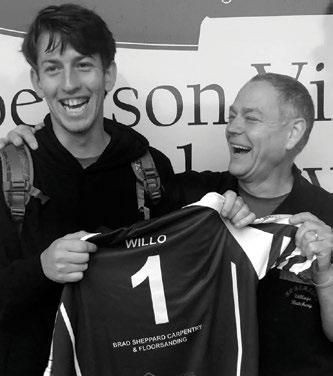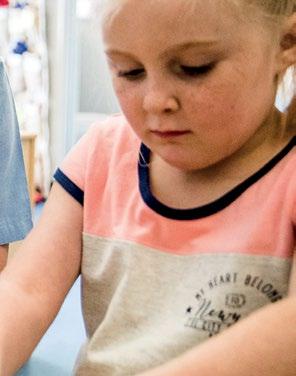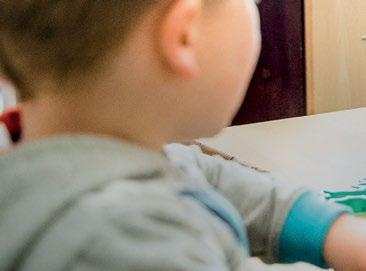
4 minute read
Where there’s a Will
Where there’s
A WILL...
The saying – where there’s a will, there’s a way – could not be truer for Ange Clarke.
Her tenacity to fight for her son, Will, has allowed her to forge a more inclusive and supportive path for him.
Will, 24, has autism, which prevents him from reading, writing and communicating effectively.
In order for him to participate in school and sport, Ange has had to fight.
“When he was young there was nothing for him that catered for his delays. Our family had to create the opportunities for him,” she says
But those battles are paying dividends, with Ange helping Will turn his passion for cricket into a business venture that is helping to hit intellectual disability stigmas for six.
The pair established Where There’s a Will – also known as Willo – a charitable organisation that builds awareness and understanding about the lack of choice and opportunities for people living with intellectual disabilities.
Hundreds of well-known artists, sports people, celebrities and politicians have contributed to the organisation by painting or decorating re-furbished cricket bats, turning them into artistic masterpieces to sell.
The latest projects funded through Willo include the seed funding for the Rainbow Innovation Centre for All Abilities at Rainbow, in central Victoria. It will provide mentoring and learning for people living with disabilities by using art, gardening and creative pursuits.
“It will offer a place for belonging, choice and opportunity,” Ange explains.
She says its humbling to see Will receive the support he now gets.
“It is very humbling especially when you experience the genuine respectful interest in Will and his journey,” she says.
“Will is so easy to love when you stop and take the time to see him and feel his heart and I feel when we visit the communities and they meet Will… it’s actually life changing.”
Cricket has been the catalyst for the change in Will’s life and, in turn, that of others.
Will first got a glimpse of the sport when he was 7 at none other than Bradman Oval and everyone soon realised his love of the game.
“Like many sports-loving people, Will simply loves being part of a team,” she says.
“He loves the camaraderie and sense of belonging. What people don’t realise is that with our children they have exactly the same needs and desires as we do.”
But, with little opportunity for her son’s inclusion, Ange established a Special Olympics program for the Southern Highlands.
“We organised the CityCountry Cricket Match on Bradman Oval that

brought together the best cricketers in NSW and this formed part of the National event program for Special Olympics Australia,” she recalls.
“Will played for 2 years with Country. He then went on to play for u/16s local cricket and has played third grade for the past five years.”
Ange says she still gets frustrated that inclusion is not universal and she’s hoping Willo will go a long way to changing the status quo.
“His choices are extremely limited as a human being. Because of his intellectual delays it is assumed he does not want for the same opportunities, so sports clubs, art groups etc do not commonly cater,” she says.
“It takes more time and patience to work with those who live with intellectual disabilities and, as a society, patience is not a skill that is normal and that is why our programs are consistently run in isolation to the normal community programs.
“Unfortunately, programs at a local level of cricket, from our experience, have not improved. It is due to Will’s tenacity over the years that he was included.
“We have no clubs in our area with a disability program. Both the Bowral and Robertson Cricket Clubs have embraced Will and have included him in teams to allow him the chance to play but he is still not selected officially. “It has come to be that at the end of every game both teams come back on and play for Will. He bowls the last over of every game. “It unites the teams and reminds everyone that the game is meant to be inclusive and to be enjoyed.”

Occupational Therapy for children






Occupational therapy can help children understand and work with their bodies so they can
complete daily activities and foster independence. An occupational therapist can help build foundation skills such as handwriting, cutting, tying shoelaces, self-care (dressing, feeding and toileting), attention, coordination, balance, movement and more. Our occupational therapists are experienced in working with children who have complex needs, developmental delay or with disability.
TELEHEALTH SESSIONS AVAILABLE
Telehealth is an alternate and fl exible way of delivering therapy services. Instead of driving to a clinic, your face-to-face appointment is virtual, using a phone, tablet or computer. No wait times, no travel costs, and ensuring the continuation of support during diffi cult times are just some of the benefi ts. Fine motor — synchronisation of hands and fi ngers with the eyes Gross motor — balance, coordination, posture, strength and endurance Self-care — daily skills such as dressing, feeding, cleaning teeth and toileting Sensory processing — the way children receive, interpret and behave to senses
Visual perception and visual motor
integration — processing visual information and matching with appropriate action Self-awareness and body awareness — understanding where our bodies are and how our bodies move










